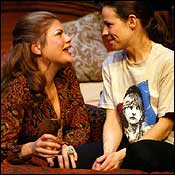
The revival of Wallace Shawn’s 1985 Aunt Dan and Lemon gives the lie to two notions: that less is more, and that the whole is greater than the sum of its parts. This piece proves conclusively that where parts are totally random, the whole is derisory, and that less can easily remain infinitesimal. A vapid play by a rambling writer, Aunt Dan owes its small but undeserved reputation to three facts: (1) Wallace Shawn is the son of an influential former editor of The New Yorker. (2) With his grotesque looks and whiny voice, Shawn has had a run as a stage and screen clown. (3) Reviewers are likely to mistake, if not nudity for new clothes, bizarre glad rags for haute couture. Example: The New Yorker’s John Lahr has written that Shawn’s work has “no plot, no set, no action,” which, believe it or not, is meant as praise.
To the other no’s should be added no coherence, no sense, and no raison d’être. In this two-hour intermissionless piece of maundering, a sickly young woman, Lemon, reflects upon her family (motley), her childhood (messy), and her beloved late “Aunt” Dan (meshuga). Only three sequences can pass for scenes. In the first, Lemon’s father and mother discuss why Lemon won’t eat, as she eavesdrops. It is of no interest. In the second, Dan debates the mother about Henry Kissinger, whom Mother deplores and Dan extols. This is a deadeningly garrulous near-monologue in which Dan keeps justifying H.K. for dealing death and destruction so the rest of us can be safe. It could be stated in a couple of sentences, but takes up six pages of the printed text, following upon five pages of near-identical near-monologue between Dan and Lemon on the same subject.
The third scene has Mindy, a money-hungry call girl, taking home Raimondo, a Hispanic cop in playboy disguise, having oral and missionary sex, then elaborately tying him up and vengefully strangling and disposing of him in a plastic bag. The scene, though hardly convincing, has the virtue of being almost wordless, and thus a pleasant respite from the Shawn word-mongering. The thing ends with Lemon’s five-page soliloquy in defense of the Nazis. If anyone can detect a connection between such sophomoric shock effects and justify six further irrelevant minor characters, he’s a better man than this critic, and a more accomplished mystagogue than this author.
Signature Theatre Company devotes each season to a single playwright, this one to Bill Irwin. His second bill is The Regard Evening, a revised version of The Regard of Flight, now over twenty years old. It is enacted by Irwin, clown protagonist, Michael O’Connor, antagonist and nemesis, and Doug Skinner, emcee, composer, pianist, and ventriloquist, with Nancy Harrington as collaborator and stage manager. There is a lot of clowning and mime, also ironic palaver about a New Theater, some comic dance, and singing of so-called homecoming songs to ukulele accompaniment.
Questions arise. Haven’t we seen most of this more than once? The old gags have lost their edge, and the new ones are less funny. Should pantomime, ventriloquism, and verbiage be mixed? The great mimes and clowns never talked. Should Irwin even be considered a playwright? Marcel Marceau never was. Why all the rave reviews? Are jester-jawers an endangered minority it is politically incorrect not to preconize?
There is no question that Irwin does well what he does. In a broadsheet that Signature offers patrons, Irwin observes, “Regard of Flight comes out of these really heartfelt impulses that soon become ridiculous and infatuous.” That malapropism may be the mot juste: Your enjoyment of Regard will depend on your tolerance for the infatuous.